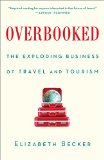Summary | Excerpt | Reviews | Beyond the Book | Readalikes | Genres & Themes | Author Bio

Critics' Opinion:
Readers' Opinion:
First Published:
Apr 2013, 464 pages
Paperback:
Feb 2016, 320 pages
 Book Reviewed by:
Book Reviewed by:
Poornima Apte
Buy This Book
Tourism has a history of confounding countries and societies. The first time the world powers tried to regularize tourism was in 1925, between the world wars, when it was considered a traffic issue. Several European countries created the International Congress of Official Tourist Traffic Associations
to minimize border formalities for tourists. That small office was the origins of the World Tourism Organization.
Nine years later, tourism was recalibrated as a propaganda, or public relations, issue focused on spreading the word about where and how to travel. In that incarnation the office was named the International Union of Tourist Propaganda Organizations. Finally, after World War II, it was decided
that tourism had risen to the level of government relations requiring the coordination of tourism agencies of various countries like the French Office National du Tourisme and the Italian Ente Nazionale per le Industrie Turistiche. Practical questions were rising along with the increased tourist traffic: Should tourists pay duties on their cameras and automobiles when traveling into a foreign country? Aren't they imports, and what if they tried to sell them?
By the 1960s the jet age of mass tourism was taking off. In 1958 a Pan American 707 flew from New York to Brussels, the first commercial jet flight across the Atlantic without stopping for refueling. A decade later a TWA 707 flew around the world beginning in Los Angeles and flying west after the plane was blessed by three Buddhist monks. Lower fares and bargain flights followed. European countries relaxed passport restrictions and began to see tourism as an important economic engine. "Tourism—
Passport to Peace" became the organization's motto in 1967, capturing its higher purpose to open borders in the promotion of better relations as well as the practical motive of making money.
As the U.N. shifted its notion about tourism, the U.N.'s tourism office was moved from The Hague to Geneva, where it was dwarfed among the cluster of U.N. offices and the International Red Cross. The move to Madrid was a step up the bureaucratic ladder even though it meant exile from
Geneva, one of the power centers of the U.N.
In Madrid the tourism organization confronted the dilemma that faced the industry: how to prove that tourism was an industry. There was no question that travel and tourism were growing. In 1950, shortly after World War II, there had been only 25 million trips recorded by foreign tourists. By 1975 that figure had exploded to 222 million trips. But there was no agreement about what that meant for any national economy. Tourism wasn't considered a single, unified economic activity. It was viewed as a constellation of industries—airlines, hotel chains, railway systems and tour agencies to name just a few. Separately those industries were taken seriously but not grouped together as the single economic activity of tourism. Most conspicuously, tourism was not listed as a separate industry on national indexes. For example, when the United States created its gross domestic product index in 1937, tourism was not included as a distinct industry. It was impossible for most countries to measure what tourism added to their economies.
From Overbooked: The Exploding Business of Travel and Tourism by Elizabeth Becker. Copyright © 2013 by Elizabeth Becker. Reprinted by permission of Simon & Schuster, Inc. All Rights Reserved.





The Funeral Cryer by Wenyan Lu
Debut novelist Wenyan Lu brings us this witty yet profound story about one woman's midlife reawakening in contemporary rural China.
Your guide toexceptional books
BookBrowse seeks out and recommends the best in contemporary fiction and nonfiction—books that not only engage and entertain but also deepen our understanding of ourselves and the world around us.